LOST 013 - Throw Another Murder On The Barbie
Charlie’s got a gun … Sawyer’s got a gun … Jin betrayed by Sun … Everybody run. Unpacking the TV show LOST — Season 1: Episodes 15-17

Note: this essay was originally published on Revue on August 1, 2022.
Recently, on LOST: Oceanic 815 crashed on an island and there were many survivors, who found many mysteries, including the existence of people already on the island. One of these—a guy named Ethan—infiltrated them, kidnapping one of their youngest of the Oceanic survivors, the pregnant Claire, leaving her erstwhile protector, the washed-up rock star Charlie, mostly dead. Also: the group’s hunter, the mystic Locke, recruited an acolyte (fellow survivor Boone) and found a strange hatch in the jungle. Now, without explanation, Claire is back!
Shall we? Let’s!
O B S E R V A T I O N
The last batch of episodes were sort of treading water. These episodes are going to up the ante and build some quality momentum for the end of the season, but … look, it’s time to return to the narwhale in the room, and that is the narrative stagnation that inevitably attends the open-ended structure around which network TV drama was/is historically built.
It’s been well documented in many interviews that this is a show that had a Big Story mapped out, but also (until late Season 3 at least) no end date to shoot for—which meant that they had no idea how many episodes they’d have to produce, other than the answer was probably “a lot, given that this show is a massive hit.” As a result, they had to pad out the narrative, so as to not find themselves having told the full story before the business asset that was the show was finished for the network. This padding resulted in flashbacks of increasingly diminishing returns, and island action extended with recursive plot loops and red herrings larding out the action between stingily portioned revelations of the main plot.
This is natural, by the way. It’s how narrative network TV always worked; the point was to make as many episodes as possible. Most TV dramas would make at most one adjustment to a basic formula per season. They weren’t designed to tell a single big story; they were designed to tell endless stories of the exact same size, for as long as they could. There were exceptions before LOST, but there weren’t very many that pushed this hard against the strictures of the form (Twin Peaks kicked mightily against the goads, but Twin Peaks was cancelled in its 2nd season for a reason), and there may not have been any that needed so badly to escape from those strictures. If we wanted to get metatextual, we might even think of the show itself as a powerful being trapped within a container it found far too restrictive, constantly seeking a loophole out of the rules within which it finds itself resentfully constrained, rules set by a higher power with which it begins to have an increasingly Adversarial relationship. I imagine this parallel occurred to the writers … but either way, there it is for us to observe.
LOST was designed to tell a single story, but it was shoved into the ice-cube tray of network TV, and it eventually suffered for it, as we are already starting to see. By Season 2, cracks would start to form, and by the midpoint of Season 3 the stagnation had become unmistakable. Not that the show became bad, exactly … but it was diminished (and yes, sometimes it got bad). We’ll actually be able to see the moment in the 3rd season the production team received permission to end the runaway hit show in order to save the runaway hit show, as the narrative slack snaps taut again.
And in this, too, LOST really changed the game. I’m not the only one who sees LOST as being a hinge between traditional cookie-cutter dramas and today’s prestige streaming shows, where the expectation very much is a beginning, a middle, and an end, with ongoing narrative propulsion and ever-shifting status quos.
And this is, again, a very well-known tale for anybody who was paying attention to the show. It’s received wisdom that because of this, Season 1 is great, Season 2 gets weird, Season 3 drags, and then it gets really good again until whatever moment you personally decide it got bad again—or, if you quit in Season 3, or you hate the story the producers had planned all along, then it really fell apart after Season 1 and you hates it, precious, you hates it forever.
However, for any of us who are watching with the buried main story in mind, it’s actually amazing to see how little of that actual story gets told in the great vaunted Season 1. The lack of progress was hidden during these episode’s first runs because the show had a lot of characters, most of them pretty great, and so there was a lot of good backstory to get to (also nobody yet had the slightest clue what the buried main story was, or what “progress” might look like) … but after establishing a few key points, the main story barely moves past “this island sure has a lot of mysteries, here are some of them” and “there are other people on the island.” I think this might be a good entry to highlight all the little cheats that the writers needed to use in order to keep the plates spinning as slowly as they’re being forced to do.
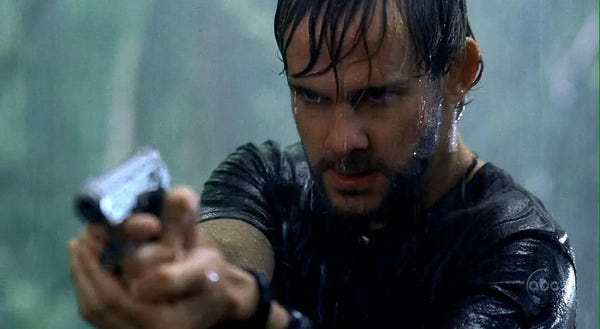
___
Episode 15: HOMECOMING (Charlie): All right! Claire is back! She’s going to have some answers about Ethan and the mysterious island group he’s with! How many Others are there? What do they want? Who leads them? How long have they been here?
Nope!
Claire has amnesia of the narrative convenience, which is annoying enough that Sayid is employed by the writers to lampshade how unlikely that is. Nevertheless, we’ll have to wait a few years to know all about what The Others were up to with Claire. Go to the “belief” portion of these proceedings for further discussion.
Charlie bonds with Claire some more and it is sweet some more. Sweetness is short-lived, however, when Ethan accosts Charlie in the jungle and chokes him right off the ground one-handed, promising to kill a castaway a day until Charlie returns Claire to him. Wow, Ethan is really strong. And evil!
Charlie does a smart thing and tells everybody what happened. There’s discussion about what’s best, including tracking Ethan to take him down or hand out guns to untrained castaways, but these are nixed by Locke and Jack respectively, so in the end, with Locke’s help, they set up booby traps to alert them and set a guard around the perimeter.
Unfortunately they put Boone on first watch, who falls asleep until the booby trap is triggered (in what seems like late morning, like, damn Boone). Our heroes go on alert but it was only Vincent, being a good boy. However, it’s also too late: Sometimes-mentioned character Scott has been murdered before he could speak his first line and get his SAG card. Ethan apparently came in from the water. Also we learn that the victim had his neck broken, as well as both arms and all the bones in his fingers. Holy shit, Ethan! Very strong and evil! And unnecessary! ALL the bones in his fingers?
Anyway, this is enough for Jack to change tactics. He gets out the guns.
Jack, Locke, and Sayid decide it’s time to hunt them up an Ethan. As they have four guns, they decide to get a 4th man, asking Sawyer of all people to join their sausage party scramble—with perfectly capable Kate standing right there! Jack is being protective but sexist; unfortunately for him, Sawyer still has a gun and offers it to Kate, like the occasionally anti-patriarchal scumbag king that he is. It’s actually a very cool and complicating character moment for all three of them.
In order to lure Ethan out, The Gang Uses Claire As Bait. And, because Jack and Ethan are about to fight, it starts to rain.
Ethan attacks, and Jack Of Course, who was twice beaten badly by Ethan last time, wins round 3, capturing Ethan.
Awesome! Now we’re finally going to get some answers about The Oth—
Charlie blows him away. He’s picked up Jack’s gun during the fracas. Murdering captured Others so the writers don’t have to release additional exposition yet is Charlie-work, apparently.
Jack’s a bit pissed at Charlie for killing the fishy he worked so hard to pull into the boat all by himself, but ultimately everyone’s actually pretty cool about the murder—understandably, considering all the terrorizing and brutal murder etc.
Claire trusts Charlie and slightly remembers him again. Charlie stares.
End of Episode 15.
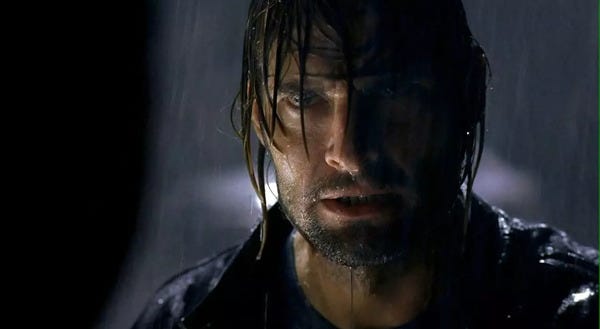
Episode 16: OUTLAWS (Sawyer). A boar accosts Sawyer at night in his tent, making off with one of his tarps, and Sawyer—who hears the jungle whispers—goes on vendetta for it, convinced it is the spirit of a man he killed. No, seriously, that’s the story. And it’s actually pretty good—this time. They’re going to do this exact same beat again with a tree frog when the creative team is starting to serious spin their narrative wheels in the network muck, and it will be … less good.
Anyway Sawyer keeps getting punked by the boar and says “son of a bitch!” a lot, and it’s funny, because Sawyer is at his best when he’s being a little ridiculous. Kate offers to help Sawyer, ostensibly to help Jack get the gun back from him (see last episode), but in reality because she is hot for Sawyer. Sawyer says “thank you … boar expert!” and it’s probably the funniest of his many nicknames. The two get cute around a campfire and play a Never Have I Ever with never-ending single-serve bottles of airplane hooch which eventually reveals that Kate has been married¹ and they’ve both killed a man. Dun Dun DUN. Boy oh boy, we sure do have a lot of murderers on the island, don’t we? Add one more from the B plot: Sayid, counseling Charlie after last episode’s murder, reveals he too has killed—a participant in a firing squad. You’re not alone, Charlie, says Sayid. Charlie stares.
In the end, Sawyer could shoot the boar and doesn’t. Then he gives Jack back the gun. Character growth!
End of Episode 16.
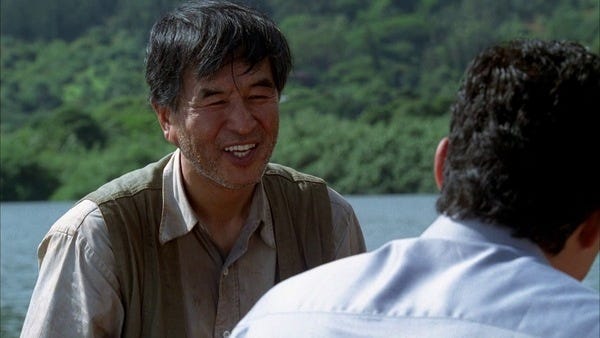
Episode 17: IN TRANSLATION (Jin). Sun is sunbathing in a modest bikini, and Jin is, as usual, a real overprotective freak about it, trying to cover her up and finally accidentally knocking her over in the struggle. Michael intercedes and Sun smacks him. Later, she approaches him as he builds his raft to let him know it was to protect Michael from Jin’s ruthlessness, not to chastise him for overstepping. Michael informs her his focus is the raft, which is looking impressive for just one person’s work. Oh wait, not one. Sawyer’s coming too, lending his supplies in exchange for a berth. Michael estimates there’s room for four, so that’s one more raft ticket.
But that night, the raft is burned to nothing. Michael and many others assume it’s the outsider (still wearing one handcuff; nice continuity there) with a vendetta against Michael —Jin. Sun goes to warn her husband, and … yikes, Jin’s hands are burned. Circumstantial evidence looks pretty damning. Sawyer finds him and kicks him in the head area a bit, dragging him back to the beach for some island justice. A scene from Jin’s perspective, in which the audio is distorted to make everyone’s English unintelligible, gives us a well-done sense of his disorientation as they argue over his fate, before Sun saves him by explaining that Jin burned his hands trying to put out the fire, not starting it. In so doing, she reveals to everyone that she can speak English—everyone including Jin, who realizes exactly how much he’s alienated himself from his love, and how unworthy of her he’s become.
Leaving Sun, he joins up, in a pleasantly unexpected (by me at the time, anyway) development … with Michael, to help him rebuild the raft. Thus begins one of the great LOST friendships.
In a coda, we discover that Locke, who has helped convince our heroes that the arsonists are The Others, actually knows that the true saboteur is … Walt. Walt just wants to stop moving. Locke promises to keep secrets.
In other news, Shannon and Sayid kiss if you care. Also the batteries run out on Hurley’s discman, so RIP to the slow-motion ending montages.
Under His Eye no more, Sun goes sunbathing in peace.
End of Episode 17.
_____
Flashbacks. Charlie’s 2nd flashback honestly tells us not much new. He’s a junkie with a washed up band. It does show him scamming a sweet rich girl in order to buy drugs, his scuzzy side winning out in the war with his sweet side as he genuinely falls for the girl and tries to go straight for her but ultimately robs her anyway. It sets up some character motivation for Charlie’s protectiveness toward Claire and desire to make good, but it’s sort of thinnish gruel. However, Charlie pukes into a copy machine he’s trying to sell, in a scene that makes good use of Dominic Monaghan’s considerable comedic chops.
Sawyer’s 2nd flashback comprises the main story of his episode, and it’s actually better than his first one. It reveals that this con man is, as always, the ultimate mark. A former colleague (Robert Patrick!) con-vinces him that the real Sawyer (the target of our Sawyer’s revenge, remember) is hiding out in Sydney running a shrimp truck. For some reason Sawyer immediately believes this shady guy who apparently betrayed him in “the Tampa job” only to discover, too late, that the man he’s murdered is just a guy who owes Robert Patrick² money. Sucker, thy name is Sawyer. Now you’re trapped on Mystery Friggin’ Island. We also learn that Sawyer met Jack’s dad, Christian, in a Sydney bar, while Christian was leaving-las-vegasing himself, and learned enough about him in their brief conversation, to recognize, on the island, the relationship between this one-time drinking buddy and his dickish nemesis/bromance. However, Jack Of Course chooses the moment of Sawyer’s awareness to snark at him, so Sawyer doesn’t tell him … yet.
Jin’s flashback is quite good, utilizing his shared history with Sun to great effect to show us the other side of the story we already saw from her perspective. It’s not exonerative to Jin, but it does help explain how the man he was became the man he now is. A fisherman’s son, Jin grew up with deeply internalized classism, ashamed of his lowly beginnings to the extent that he has abandoned his father, telling everyone (even Sun) that he is orphaned. In order to keep his position with Sun’s industrialist father, which he clearly believes he needs to hold in order to “earn” Sun’s hand in marriage, he neglects the very relationship he’s trying to deserve, and becomes an increasingly violent enforcer for his father-in-law. There are some very nice “other side of the coin” moments from Sun’s flashback; the dog Jin gifted Sun comes from an intimidated government official, for example, and when Sun sees his knuckles bloodied, it’s from a brutality he inflicted to prevent an implied fatal attack from another of Mr. Paik’s associates. We learn that Jin finally reunited with his fisherman father in the days before the fateful Oceanic trip, a lovely guy who convinced him to make his trip delivering watches in Sydney and LA the last thing he did for his toxic father-in-law before quitting to focus on what truly matters—his love with Sun … the same love that he now believes he’s killed.
Add Jin to the “sad irony backstory” pile.
B E L I E F
Alrighty, we’ve observed. Let’s dig into some belief.
1) Sawyer’s boar. Yes, there are definitely spirits on this island, and yes, we’re definitely encouraged to believe they sometimes manifest through animals on the island when they want to interact with the living. Personally, I don’t have any larger theories … but we might keep an eye on the island animals and how they behave. Vincent in particular strikes me as worth speculating about, though again I don’t really have any specific theories about the how or the wherefores, but I will note that he distracted the perimeter guard when Ethan attacked. As far as I’m concerned you can take this one or leave it. As for me … well, I’m a “take it” sort of fella, freckles.
2) Ethan’s motivations. OK, so let’s dig into The Others and their whole deal and then compare what we know to the actions of the most prominent Other of Season 1, which is Ethan.
Let’s lay it out. MASSIVE SPOILERS NOW COMMENCE UNTIL ITEM 3
“The Others” are a group of well-funded and highly resourceful members of an already existing island faction that is loyal to Jacob through Ricardo (see previous entry), who years ago purged all members of a scientific operation called the Dharma Initiative, with the help of a minor Dharma Work Man (hilariously, that’s his official title) named Ben Linus, who was enthralled by The Adversary and joined the Jacobians after the purge. At some point, Linus wrested control of a faction of the Jacobians, not breaking off ties entirely, and keeping Ricardo as a willing consultant, but taking over the Dharma facilities and seemingly even its funding apparatus while operating as the primary political (for want of a better word) force on the island.
Linus has direct contact with The Adversary, and has for decades. He’s been able to use this relationship to learn many things about the island that nobody else knows, and to make enough people suspect that he has direct contact with Jacob—a misapprehension he encourages—to keep himself atop the power structure.
His faction is dealing with a few major challenges, including trying to avoid detection by billionaire Charles Widmore, Linus’ predecessor as leader, who Linus banished years ago, as well as Linus’ own recently-diagnosed brain cancer. Most of all, they are dealing with an inability for women on the island to carry pregnancies to term, which is why Claire is of such interest—as are any children drawn there. The on-island faction has been here for a very long time (it would be reasonable to assume they go back as far as Ricardus does), and they are at risk of going extinct.
Ethan, we’ll learn, is a doctor, and a very good one. This is interesting, because he’s also somebody who kills remorselessly, even with needless brutality and cruelty (all the bones in poor Scott’s fingers?), and evinces the sort of endurance and strength you’d expect from a Navy Seal or maybe Captain America or something. He’s also one of Ben’s most trusted lieutenants; like Ben, he’s a child of Dharma Initiative members who defected to the Jacobian faction as a child.
My guess? He’s what Rousseau calls infected: someone who is entirely and perhaps willingly in thrall to The Adversary, and who is therefore subject to entering into a murderous state in which he is fully aware but not entirely himself. We’ll see evidence for this in future flashbacks involving Ethan, and I’ll try to remember to point these out. (Fun phrase, that: future flashbacks.)
I believe The Adversary has Ethan entirely captured, and pushes him to these extremes for a number of reasons. It’s in Its interests to keep different factions as distrustful as possible of one another, for one. But I think another reason is that this puts Ethan in a position where he was likely to be killed, which I believe would make whoever did it more susceptible to being enthralled, but I also believe The Adversary may well have wanted Ethan killed—because Ethan is The Others’ surgeon, and therefore somebody who could possibly help Ben Linus with his cancer.
And, as we’ll see later, while it’s not necessarily true that The Adversary wants Ben Linus to die, there’s reason to believe The Adversary wants Ben Linus scared and desperate and at the mercy of the new arrivals—which he would be all the more now that his fellow Adversary-aligned friend and surgeon is dead.³
Jack is, after all, a neurosurgeon.
3) Can you stand the rain? My crack about it raining because Jack and Ethan are about to fight was only half a joke. This is another place where a belief that The Adversary has some control over island weather and that rain attends moments when he’s particularly active bears some fruit. If Ethan is somebody who is fully in thrall to The Adversary, and Locke is on his way, and Charlie is somebody who is perhaps partially in thrall, then a murdery altercation involving all three seems likely to get good and rainy.
4) Walt burned the raft. Watching this episode again, I’m struck by how deftly Terry O'Quinn plays the scene in which this is revealed, which could just as easily be a kindly uncle figure gently sharing a game of backgammon with his young friend while building trust over a shared secret, as it could be an Adversary-enthralled island leader gathering valuable allies as he plans to establish permanent influence upon his new home. Walt, who is clearly of interest to The Adversary, and who likes life on the island enough to torch his dad’s boat in order to stay, clearly fits the bill … especially if Walt, as seems increasingly likely (though this is never seen), has himself been approached by The Adversary. “Why would any of us interfere with any attempt to get off the island?” asks Locke, in a rhetorical attempt to move suspicion for sabotage away from Jin (or Walt) and toward The Others … but Locke has himself interfered in such attempts already. It’s something The Adversary’s followers tend to do. It’s something Walt has done.
By the way, how did Locke know that Walt did it? Maybe Locke was watching it all happen. Maybe Locke used his tracking skills to sleuth it out. But that’s not what I believe.
I believe The Adversary told him.
L O S T
Next Time: Running The Numbers
_____
¹ Given that it’s Kate, rest assured that when this bit of backstory is revealed it will make a lot of sense.
² They must have intended him as a recurring character, right? I guess maybe not, but it’s a very small role to bring Robert Patrick in for. Maybe they had thoughts of revealing him as Real Sawyer eventually. Who knows?
³ There’s a temptation to say “yes, but the writers didn’t know any of this at the time, so it’s not true at this point of the story,” which misunderstands how story works. It’s an easy misunderstanding to make in episodic TV because we consume it before it’s done being created or even conceptualized. But we are not the authors; we are the audience. There exist narrative forms audiences only consume once the whole thing is done (like most novels, plays, or movies) and within those forms I promise you there exist scenes that were crafted by the author(s) before they knew all the answers to the questions raised by that scene. We don’t burden art in those forms with such expectations around what the author knew when they wrote what, and I see no reason to burden episodic TV with it, either. The things we will learn about Ben Linus and the Others apply retroactively to the entire show, and the sense we can make out of them are the story. I’ll probably bang on about this 42 more times during this series.
_____
A.R. Moxon is the author of The Revisionaries, which is available in most of the usual places, and some of the unusual places. If you can get a better deal on a newsletter anywhere else, his name ain’t Nathan Arizona.

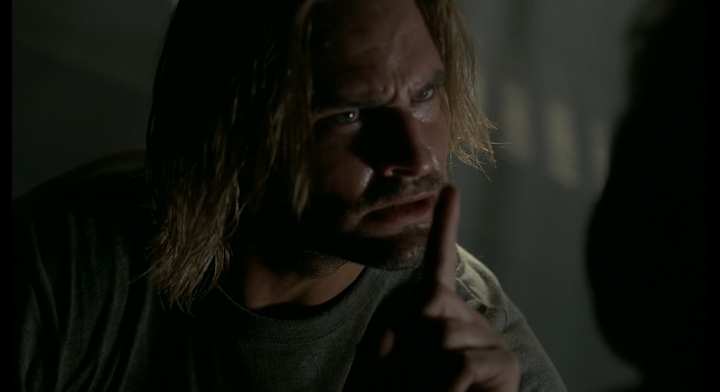
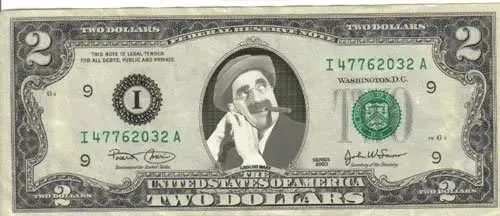
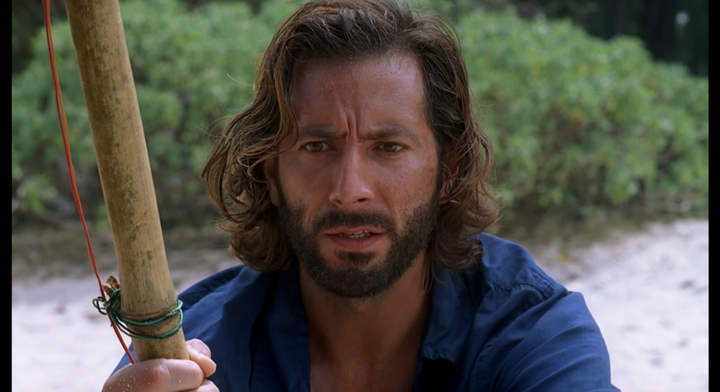
Comments ()